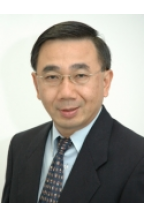Michael Tam, PEng

Biography
Michael K.C. Tam is a Professor in the Department of Chemical Engineering and a University Research Chair at the University of Waterloo.
His research focuses on the microscopic and macroscopic properties of nanomaterials, self-assembly systems such as surfactants, block copolymers, and associative polymers. The scope of his work includes polymer synthesis using atom transfer radical polymerization (ATRP), physical characterization using light scattering (static and dynamic), rheometry, and calorimetry (ITC and DSC). Professor Tam aims to correlate the polymer architecture to the microscopic and macroscopic properties of novel self-assembly systems. The potential applications of his research are in water purification, oil and gas, bio and chemical separations, personal and home care products and environmentally friendly coating systems.
Professor Tam is also conducting research on the field of sustainable nano materials from renewable resources. In collaboration with Celluforce Inc., a company that operates the first cellulose nanocrystals pilot plant production facility, he aims to functionalize cellulose nanocrystals for water treatment, cosmetics, personal care, coatings and food, among other purposes.
In recognition of his research work, Professor Tam was presented with the Harold Jan Shoemaker Award for the best paper published in the Journal of Hydraulic Research between 1990 and 1992. Additionally in 2005, Professor Tam was the recipient of the Tan Chin Tuan Fellowship from the Physical Chemistry Division at Lund University in Sweden.
Research Interests
Biochemical & Biomedical, enhanced drug delivery systems, Polymer Science, Nanotechnology, Water-soluble fullerene systems, Responsive self-assembly systems, Magnetic nanoparticles for separation processes, Atom transfer radical polymerization, Stimuli responsive polymeric systems, Interfacial Phenomena, Colloids & Porous Media, Sustainable Nanomaterials, Associative polymers for environmentally friendly coatings, Magnetic nanoparticles for novel separation processes, Cellulose nanocrystals, Polymer-surfactant interactions, Additive Manufacturing, Water, Separation Processes
Scholarly Research
Research Interests:
My research focuses on the development of well-defined block copolymers and responsive functional microgels for various chemical and biomedical applications. It contains three key parts, namely; (a) controlled polymer synthesis, (b) physical characterization of well-defined polymeric systems and microgels, (c) applications in delivery systems and purification processes. The research program will produce fundamental scientific information on the self-assembly behavior and microstructures of novel polymeric and microgel systems that will facilitate the development of better delivery vehicles and separation media for drug/gene delivery and protein purification respectively.
Position(s) held:
(1) Chairman of task force to develop the Chemical & Biomolecular Engineering degree programme at NTU, 2003-2004,
(2) Sterling Committee Member, 2001 to 2007
Advanced Materials Research Center, Nanyang Technological University,
(3) Laboratory Director - Biological & Chemical Process Laboratory, 2004 to 2007
School of Mechanical & Production Engineering, Nanyang Technological University,
(4) SMA Fellow, 2001 to May 2007,Singapore-MIT Alliance, involve in the teaching and graduate research of the program.
Industrial Research
Performed consultancy work for:
(a) Revertex - 1996-97, rheology of water-borne coatings,
(b) Becton Dickinson - 1998-99, ageing and discolorisation of plastic syringes.
Education
1991, Doctorate Chemical Engineering, Monash University, Australia
1982, Bachelor's Chemical Engineering, Monash University , Australia
Awards
2011 For contributions to the development of sustainable nanomaterials and functional colloids
1993 Harold Jan Shoemaker Award
2005 Tan Chin Tuan Fellowship
Selected/Recent Publications
Wang, Y.; Zhao, W.; Lee, Y.B..; Li, Y.; Wang, Z.; Tam, K.C., Dynamic Water Gating Enhanced Thermo-Adaptive Solar Interfacial Evaporation, Nature Communications (2024) 15, 6157 (1-13)
Tang, C.; Yan, X.; Tam, K.C., Cross-Linked Cellulose Nanofibril Aerogel with Multi-scaled Pores and Dual Wettability for Emulsion Separation, ACS Sustainable Chem. Eng. (2024), 12, 656–664
Grishkewich, N.; Mohammed, N.; Toffolo, K.; Tam, K.C., In-Situ Production of Cellulose Nanocrystal-Alginate Hydrogel Beads and Dye Removal in Fixed Bed Adsorption Column, ACS EST Water, (2023), 3 (8), 2267-2276
Wang, Y.; Zhao, W.; Han, L.; Xu, J.; Tam, K.C., Biomimetic Surface Engineering for the Fabrication of Sustainable Water Harvesting Systems, Nature Water, (2023) 1 (7), 587-601
Baek, J.; Ramasamy, M.; Cho, D.G.; Soo, C.C.; Kapar, S.; Lee, Y.C.; Tam, K.C., A New Approach for the Encapsulation of Saccharomyces cerevisiae using Shellac and Cellulose Nanocrystals, Food Hydrocolloids, (2023), 134, 108079
Wang, Y.; Zhao, W.; Xu, J.; Zhou, X.; Luu, W.; Han, L.; Tam, K.C., Topographical Design and Thermal-Induced Organization of Interfacial Water Structure to Regulate the Wetting State of Surfaces, JACS Au, (2022), 2, 1989-2000
Wang, Y.; Zhao, W.; Han, M.; Guan, L.; Han, L.; Hemraj, A.; Tam, K.C., Sustainable Superhydrophobic Surface with Tunable Nanoscale Hydrophilicity for Water Harvesting, Angew. Chem. Int. Ed. (2022), e202115238 (1 of 13)
Ouyang, Zhaofeng and Xu, Dewen and Yu, Hou-Yong and Li, Shenghong and Song, Yi and Tam, Kam Chiu, Novel ultrasonic-coating technology to design robust, highly sensitive and wearable textile sensors with conductive nanocelluloses, Chemical Engineering Journal, 131289, 2022
Guo, Zonglei and Liu, Jie and Li, Yanyan and Lin, Haifeng and Wang, Hui and Tam, Kam Chiu and Liu, Guangyong, Effects of dispersion techniques on the emulsion polymerization of methyl methacrylate, Colloid and Polymer Science, 1, 2021
Abdalkarim, Somia Yassin Hussain and Chen, Lu-Min and Yu, Hou-Yong and Li, Fang and Chen, Xiang and Zhou, Ying and Tam, Kam Chiu, Versatile nanocellulose-based nanohybrids: A promising-new class for active packaging applications, International Journal of Biological Macromolecules, , 2021
Mohammed, Nishil and Lian, Han and Islam, Muhammad Shahidul and Strong, MacKenzie and Shi, Zengqian and Berry, Richard M and Yu, Hou-Yong and Tam, Kam Chiu, Selective adsorption and separation of organic dyes using functionalized cellulose nanocrystals, Chemical Engineering Journal, 129237, 2021
Baek, Jiyoo and Ramasamy, Mohankandhasamy and Willis, Natasha Carly and Kim, Dae Sung and Anderson, William A and Tam, Kam C, Encapsulation and controlled release of vitamin C in modified cellulose nanocrystal/chitosan nanocapsules, Current Research in Food Science, 215, 2021
In The News
Graduate studies
I am currently seeking to accept graduate students. Please submit your graduate studies application and include my name as a potential advisor.